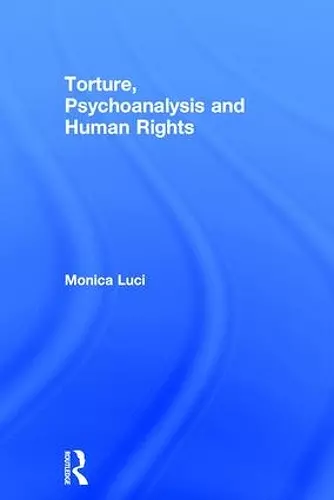Torture, Psychoanalysis and Human Rights
Format:Hardback
Publisher:Taylor & Francis Ltd
Published:3rd May '17
Currently unavailable, our supplier has not provided us a restock date
This hardback is available in another edition too:
- Paperback£41.99(9781138908604)

Torture, Psychoanalysis and Human Rights contributes to the development of that field of study called ‘psycho-social’ that is presently more and more committed to providing understanding of social phenomena, making use of the explicative perspective of psychoanalysis. The book seeks to develop a concise and integrated framework of understanding of torture as a socio-political phenomenon based on psychoanalytic thinking, through which different dimensions of the subject of study become more comprehensible.
Monica Luci argues that torture performs a covert emotional function in society. In order to identify what this function might be, a profile of ‘torturous societies’ and the main psychological dynamics of social actors involved – torturers, victims, and bystanders – are drawn from literature. Accordingly, a wide-ranging description of the phenomenology of torture is provided, detecting an inclusive and recurring pattern of key elements. Relying on psychoanalytic concepts derived from different theoretical traditions, including British object relations theories, American relational psychoanalysis and analytical psychology, the study provides an advanced line of conceptual research, shaping a model, whose aim is tograsp the deep meaning of key intrapsychic, interpersonal and group dynamics involved in torture.
Once a sufficiently coherent understanding has been reached, Luci proposes using it as a groundwork tool in the human rights field to re-think the best strategies of prevention and recovery from post-torture psychological and social suffering. The book initiates a dialogue between psychoanalysis and human rights, showing that the proposed psychoanalytic understanding is a viable conceptualisation for expanding thinking of crucial issues regarding torture, which might be relevant to human rights and legal doctrine, such as the responsibility of perpetrators, the reparation of victims and the question of ‘truth’.
Torture, Psychoanalysis and Human Rights is the first book to build a psychoanalytic theory of torture from which psychological, social and legal reflections, as well as practical aspects of treatment, can be mutually derived and understood. It will appeal to psychoanalysts, psychoanalytic psychotherapists and Jungians, as well as scholars of politics, social work and justice, and human rights and postgraduate students studying across these fields.
"The strengths of this book are subtle and important. It provides a unique and innovative approach to a painful and topical problem. It creates a new methodological framework combining psychoanalysis and human rights, within the context of the actual realities of working with those who were tortured. It is for these reasons that it represents a substantial contribution to the field. Strongly recommended both to specialists and general readers."-Renos K. Papadopoulos, Ph.D., Professor and Director, Centre for Trauma, Asylum and Refugees, University of Essex, UK.
"A striking and original integration of several fields. Monica Luci’s experience, knowledge and vision enable her to locate torture at all points along a line ranging from a vicious, corrupt and oppressive societal phenomenon to clinical work with victims. Hence the book will deeply interest a plurality of readers, ranging from specialists in human rights to therapists of all schools who need guidance and inspiration in this area."-Andrew Samuels, former Chair, UK Council for Psychotherapy and Professor of Analytical Psychology, University of Essex.
‘The strengths of this book are subtle and important. It provides a unique and innovative approach to a painful and topical problem. It creates a new methodological framework combining psychoanalysis and human rights, within the context of the actual realities of working with those who were tortured. It is for these reasons that it represents a substantial contribution to the field. Strongly recommended both to specialists and general readers.’ – Renos K. Papadopoulos, PhD, Professor and Director, Centre for Trauma, Asylum and Refugees, University of Essex, UK
‘A striking and original integration of several fields. Monica Luci’s experience, knowledge and vision enable her to locate torture at all points along a line ranging from a vicious, corrupt and oppressive societal phenomenon to clinical work with victims. Hence the book will deeply interest a plurality of readers, ranging from specialists in human rights to therapists of all schools who need guidance and inspiration in this area.’–Andrew Samuels, former Chair, UK Council for Psychotherapy and Professor of Analytical Psychology, University of Essex
'Monica Luci has written a brilliant and searing book. It is deep and wide reaching, with great courage and fortitude as a writer and thinker, she considers the catastrophic experience of torture: the "what" and the "why" and the "how" of torture. Luci explores what arguably is the most toxic threat to democratic process and civilized society. Among the many heartbreaking conclusions her book arrives at is the terrible destruction of subjectivity that is the aim and outcome of torture. Luci has undertaken, and very clearly achieved, an in-depth exploration of how deeply we can benefit from a psychoanalytic (and social and moral) examination of torture, of torture-driven social formations and of the conditions of social and economic vulnerability which make any group vulnerable to becoming torturers.’ – Adrienne Harris, PhD, Sandor Ferenczi Center, The New School, USA
ISBN: 9781138908598
Dimensions: unknown
Weight: 670g
278 pages